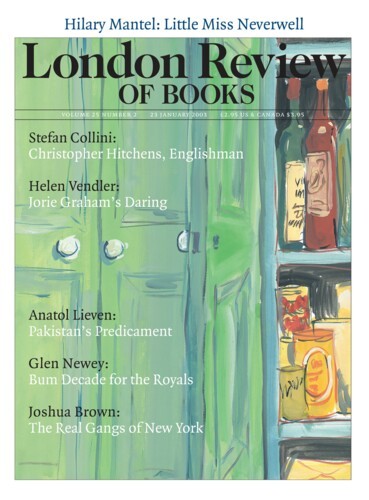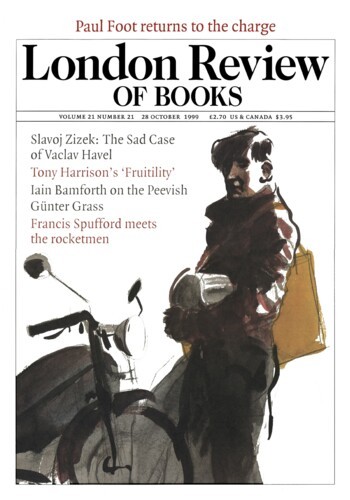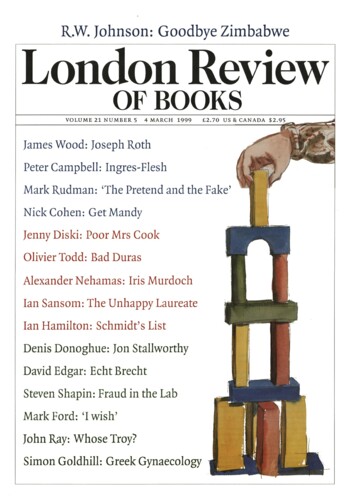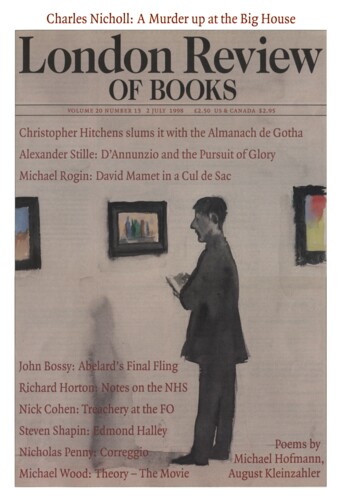Nick Cohen
Nick Cohen’s Cruel Britannia is published by Verso.
There is no alternative to becoming Leadbeater: Charles Leadbeater
Nick Cohen, 28 October 1999
A few years ago, in the mid-Nineties, the Independent attempted to halt its decline with a bold stroke. For the first time in the history of journalism a national newspaper sold itself as a think tank pamphlet. Two of those hired to fill senior editorial positions, Charles Leadbeater and Martin Jacques, were ex-Communists who had wound up their party and formed Demos, a research centre aligned to Tony Blair’s New Labour project. Geoff Mulgan, a former Trotskyist and director of Demos, became a contributor to the paper’s opinion pages, as did a strange young man who had changed his name from Keith Ashworth to Perri 6. Hacks have a strong craft consciousness: they regard all senior editors who have not proved they are tough enough to cover hard news as effete and overpaid timewasters who will bring ruin on a newspaper. To make matters worse for the leftish reporters on the Independent, our new masters’ ideas, in so far as they could be understood, appeared to be as reactionary as those of the right-wing press. Yet however hard we tried to oppose, our hostility was muted and unsatisfactory. The Demos crowd didn’t talk like Tories. They appeared to care about inequality and rejected accusations of complicity with Thatcherism with bewildered impatience. The very notions of ‘left’ and ‘right’ were dead, we were told. In their place was a modern paradigm which lay in the tiger economies of the East, much celebrated for a couple of years – until they had the bad manners to collapse. In the end, it was the tone of voice, rather than what was said, that jarred. Leadbeater and the rest had lost their faith in socialism, but in their conversation you could still hear the sharp accents of Marxist teleology. The gap between ‘is’ and ‘ought’ was hardly worth arguing about. History was moving down the tracks; questioning the inevitable was pointless. After being given a long lecture in this vein, an old hand staggered out of an editorial conference. ‘These people used to go to Moscow and say, “I’ve seen the future – and It Works!” ’ he bellowed. ‘Now they go to Singapore and cry: “I’ve seen the future – and Gosh!” ’
Delivering the Leadership: Get Mandy
Nick Cohen, 4 March 1999
In his realist classic of 1984, First among Equals, Jeffrey Archer has a Labour minister from a Northern constituency disappearing with a prostitute for five minutes or so. She recognises Raymond Gould and turns to blackmail once the business is done. Gould refuses to deal and she takes her tale to Mike Molloy, a Mirror reporter. Molloy confronts Gould, who refers him to his solicitor, Sir Roger Pelham.
Benetton Ethics: Treachery at the FO
Nick Cohen, 2 July 1998
When New Labour took office on 2 May 1997, supporters who had watched the Party’s rush to the right had already learned to put their faith in the God of Small Things. True, they sighed, Blair and the rest had accepted social authoritarianism, ‘flexible’ working practices, rampaging inequality and Conservative taxation and spending programmes. Yet for all the compromises, there were still cheering contrasts between the old and new regimes. The leftish Australian writer, Richard Neville, was quoted with approval: ‘There is perhaps an inch of difference between an Australia governed by Labour and an Australia governed by the right, but, believe me, it is an inch worth living in.’ Or as Charlie Whelan, Gordon Brown’s spin doctor, put it when I remarked a few weeks after the new dawn broke that it was difficult to know whether there had been a change of government: ‘Bollocks, Cohen. What about the landmines?’ What about the landmines?
Read anywhere with the London Review of Books app, available now from the App Store for Apple devices, Google Play for Android devices and Amazon for your Kindle Fire.
Sign up to our newsletter
For highlights from the latest issue, our archive and the blog, as well as news, events and exclusive promotions.




